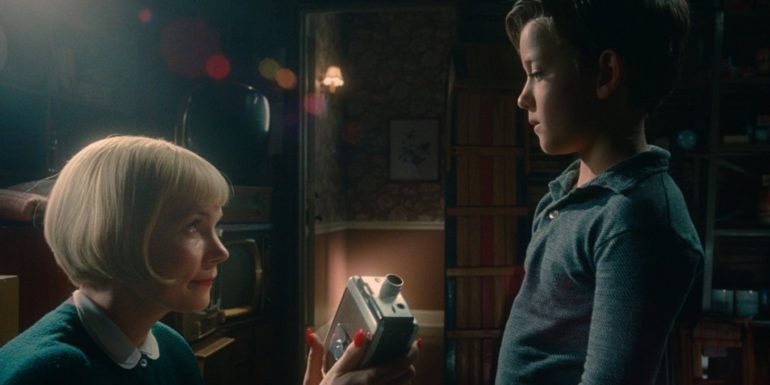It’s only fair that Steven Spielberg got to make The Fabelmans. After spending five decades crafting so many childhood memories through his patented blend of wonder, woes and whimsy, the man has earned enough kudos and goodwill to examine his own adolescence through his medium of choice. We’ve had a few directors doing this lately; Charlotte Wells broke hearts with camcorder footage and Paul Mescal in Aftersun, while James Gray brought us another interpretation of Jewish teenage angst in Armageddon Time. But there’s much more riding on The Fabelmans. Besides coming from one of the few directors who can claim to be a household name, it comes at a time in Spielberg’s life when most other people have long since stopped pursuing their loftier goals to settle into quiet retirement. Obviously, Spielberg has no such intention; his next project is a remake of Steve McQueen’s suspension-breaker Bullitt. Yet, The Fabelmans seems to want to explain so much. Where did everyone’s favourite dinosaur-wrangling, beach-threatening, alien-embracing auteur come from?
Well, Spielberg is an Ohioan, but The Fabelmans tweaks a few little details to avoid accusations of navel-gazing. Still, just like Spielberg was, a young Sammy Fabelman (Mateo Zoryan) is taken by his doting parents (Paul Dano and Michelle Williams) to see his first film. It’s still funny that so consummate a filmmaker got the filmmaking bug from something as clunky as DeMille’s The Greatest Show On Earth, but here we are. Watching a train crash into a car on the tracks, little Sammy feels the need to make it happen again. His father is a buttoned-down engineer, but he does have an 8mm camera. Mom’s the artistic one, and helps little Sammy procure said camera to make the precursor to Jaws and Minority Report. If this all sounds rather mawkish, the typically blue and oversaturated lighting from Spielberg’s regular DoP Janusz Kaminski won’t help. The opening act of The Fabelmans is rich in that easygoing emotionality that can only be described as Spielbergian. Everywhere there’s a well-wisher, and not just at Hanukkah. It’s sappy, but hardly cynical; Spielberg and his Lincoln and Munich screenwriter Tony Kushner threaten to fall on the wrong side of cloying, but they’re rescued time and again by Williams. Spielberg shifts away from his usual treatises on absent father figures to investigate what made his mother tick. The late Mother Spielberg, Leah Adler, deserves no less; receiving his Best Director Oscar for Schindler’s List, Spielberg called her his lucky charm while declaring his love. The five-time Academy Award nominated Williams brings Mrs. Fabelman to life, infusing this most happy-go-lucky of mothers with perky charm that carries through to the latter half of the film, when life takes some unwelcome detours. No matter what happens, you hope Mama Fabelman will be there for you. Every time Williams breaks into a smile, so will you.
Mrs. Fabelman has to keep the show on the road; this being a Spielberg film, tumult always threatens leafy suburbia in one way or another. This time, rather than cyborgs or Tom Cruise’s need for attention, domesticity itself becomes the threat. Determined to provide better for his family, Mr. Fabelman (Dano giving a lovely performance in a sometimes-thankless role) moves his family (plus his best pal Benny, played by a vaguely subdued Seth Rogen) to Arizona where he’s taken a better job. This move coincides with the beginning of Sammy’s adolescence. The teenage version of Sammy is played by Gabriel LaBelle. He may be playing a young Spielberg, but his haircut and jawline recall Sam Waterston. This mid-section in Arizona is when The Fabelmans really hits its stride, as the sweet-but-sentimental depictions of choo-choos and grandmothers segues into Sammy making cowboy pictures with his pals, in the vein of his filmmaking hero John Ford. Naturally, the filmmaker finds the filmmaking the most interesting part of the story, and the scenes of Sammy’s films shoots are infused with a giddy joy of creation and endeavour. His audiences may be humble (Classmates, his scout troop), but encouragement lies therein. In a year that has seen the usual ‘movies about movies’ get particularly dark (Babylon, Blonde), The Fabelmans recognizes the perspective that films (and making them, in particular) can offer. Sammy develops his directorial gifts while his mother rediscovers the joys of playing piano. Encouragement comes in all shapes and sizes; cue Judd Hirsch in an entertaining appearance as Ma Fabelman’s uncle. One of the best scenes sees both indulge momentary flashes of inspiration, as the son films his mother dancing while bathed in the glow of a car’s headlights. It’s a simple idea, but Spielberg knows how to find the sublime therein. Yet, despite the beauty of such moments, the efforts of mother and son seem doomed to end differently.
West End Story proved that, even in a new genre to him, Spielberg is a master of storytelling with grace like few other directors these days. If The Fabelmans isn’t quite up to his musical foray, it’s likely due to a reliance on a few too many tropes we’ve seen before. As Sammy progresses to high school, and the Fabelman clan moves once again, the move to a new town and state makes young Sammy and his three sisters very aware of who they are. The Fabelmans depicts antisemitic hostility towards young Sammy, but it comes from jock athletes that wouldn’t feel out of place in West Side Story. There’s a lot of coming-of-age old reliables here (Prom, first girlfriend, family strife), but it’s hard to feel cynical about it when we remember that Spielberg is telling his story. It only figures that a man who’s tapped into collective fears and imaginations via everyday Americana should come from that same background. At the end of the day, Sammy’s a good kid, defined by a few lucky breaks and a few more heartbreaks. That’s Spieberg’s story, and The Fabelmans works because it’s your story too. Bring your mother to see it, and be thankful.

